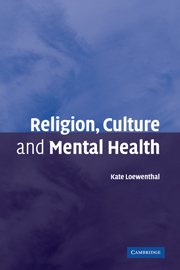8 - Positive states
Published online by Cambridge University Press: 22 September 2009
Summary
Religion and positive mood: definitions and associations
Finally, we turn to the so far neglected issue of happiness and other positive states of well-being. How do these relate to religion and culture? Do these positive states have any impact on psychopathology?
To begin with, in an attempt to keep the terminology issue as simple as possible, I focused first on finding definitions of the term happiness. Definitions were not offered in any of the handbooks of psychiatry and clinical psychology that I consulted; in fact, it was not even indexed in most. Both our well-worn family Shorter Oxford English Dictionary (Little, Fowler & Coulson, 1950) and an up-to-date online dictionary (Longman, accessed 2005) seemed – at first glance – embarrassingly tautological. The Oxford dictionary said that happiness was ‘the quality or condition of being happy’, while the Longman dictionary, more than fifty years later, had advanced to saying that happiness was ‘the state of being happy’. Probing further, however, I found that the Oxford dictionary did offer a fine range of definitions for ‘happy’, of which the most satisfactory general one was ‘having the feeling arising from satisfaction with one's circumstances or condition; also glad, pleased’. The Longman dictionary, very similarly, offered ‘having feelings of pleasure, for example because something good has happened to you or you are very satisfied with your life’.
What are the causes of happiness? The Oxford and Longman dictionaries converge in their view of happiness as caused by satisfaction with one's life situation.
- Type
- Chapter
- Information
- Religion, Culture and Mental Health , pp. 125 - 139Publisher: Cambridge University PressPrint publication year: 2006



